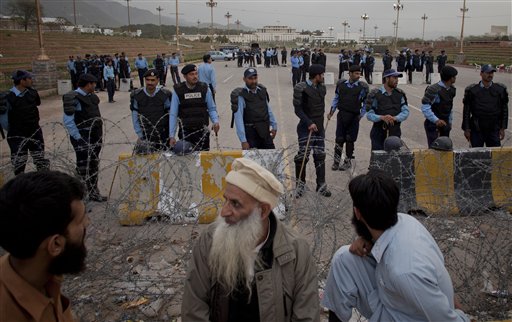(AP) Pakistan army chief meets top US commanders
By SEBASTIAN ABBOT
Associated Press
ISLAMABAD
Pakistan’s army chief held talks Wednesday with top U.S. commanders for the first time since American airstrikes killed 24 Pakistani soldiers last year and triggered a near collapse in the nations’ already troubled ties at a vital stage in the war in neighboring Afghanistan.
The meeting between Gen. Ashfaq Parvez Kayani and the top U.S. commander in the region, Gen. James Mattis, and the top commander in Afghanistan, Gen. John Allen, could be a significant step toward rebuilding a relationship seen as key to U.S. hopes of withdrawing from Afghanistan.
Pakistan retaliated for the airstrikes by kicking the U.S. out of a base used by American drones and closing its border to supplies meant for NATO troops in Afghanistan. Public meetings between U.S. government and army officials, previously frequent visitors, have been sharply curtailed.
A Pakistan army statement said the men were to discuss the investigation of the American airstrikes in November on the Afghan border and ways to improve frontier coordination. The talks were being held at army headquarters in Rawalpindi, just outside the capital, Islamabad, a senior officer said on condition of anonymity because the talks were still under way.
Mattis said earlier this month the talks would be about opening the supply lines.
The U.S. has said the attacks were an accident, but Pakistan claimed they were deliberate. It has since sought to refashion the contours of an alliance already hobbled by mistrust and Pakistani anger at American drone strikes against militants on its soil.
Pakistan’s parliament is currently debating a revised framework for its relationship with the U.S.
Washington hopes the process will result in the border being reopened to NATO supplies, but it’s unclear whether the U.S. would be willing to meet the parliament’s demands and whether the parliamentarians themselves can come to a consensus.
The proposed demands being debated include an apology for the airstrikes, an end to American drone attacks in the country and more money for NATO supplies that are shipped through Pakistan. Prior to the blockade, around half of the U.S. war supplies to Afghanistan were trucked over Pakistani soil.
The U.S. is eager to get the supplies moving again because it has had to spend much more money shipping goods by an alternative route that runs through Central Asia. The supply line through Pakistan will also be key to trucking out equipment as the U.S. seeks to withdraw most of its combat forces from Afghanistan by the end of 2014.
A stable relationship is also important because Pakistan is important in striking a peace agreement with the Afghan Taliban, whose leaders are based on its soil.
Pakistan would benefit from patching up relations because U.S. assistance has helped keep its struggling economy afloat. The U.S. has given Pakistan billions of dollars in aid since 2001 to enlist its support in fighting Islamist militants.
Washington has expressed regret for the border incident but avoided a formal apology. U.S. officials were reportedly preparing to apologize last month but had to postpone the plan after U.S. soldiers burned copies of the Quran in Afghanistan. President Barack Obama apologized for that, bring criticism from political opponents.
Pakistani officials have repeatedly criticized the attacks as a violation of the country’s sovereignty, but the government has helped with some of the strikes in the past. That cooperation has come under serious strain as the relationship between the two countries has deteriorated.
Obama met with Pakistani Prime Minister Yousuf Raza Gilani on the sidelines of a nuclear summit in Seoul, South Korea, on Tuesday. He said the U.S. and Pakistan are seeking a balanced partnership that respects Pakistan’s sovereignty “but also respects our concerns with respect to our national security and our needs to battle terrorists who have targeted us in the past.”

COMMENTS
Please let us know if you're having issues with commenting.